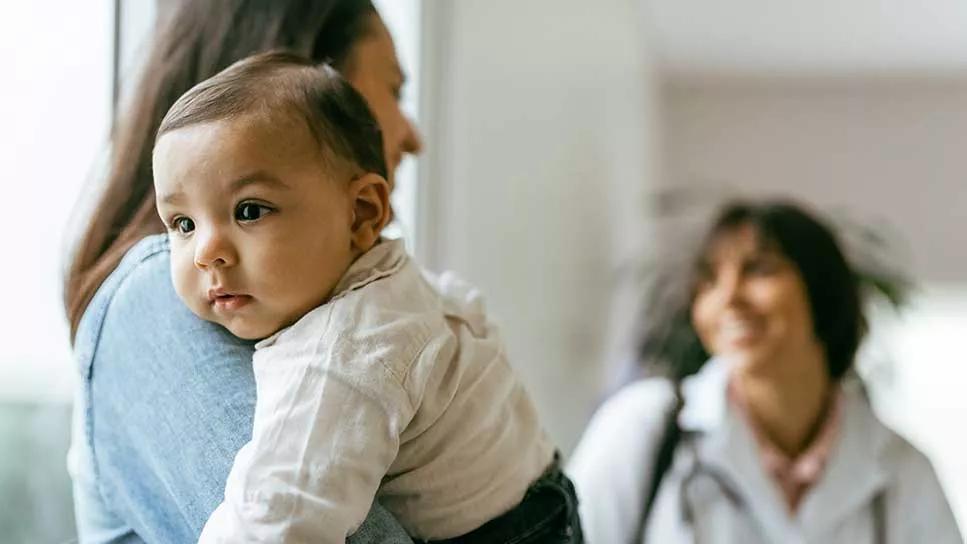Surprise: A lot more than adults!

Image content: This image is available to view online.
View image online (https://assets.clevelandclinic.org/transform/5500259d-87b9-4cac-b19a-d8c7a5757c1c/Baby-Bones-1402376525-967x544-1_jpg)
parent holding baby at a doctor's appointment
Babies are a delightful bundle — soft skin, tiny toes and cute little legs. Interestingly, that squishy little body has more bones than yours. Almost 100 more!
Advertisement
Cleveland Clinic is a non-profit academic medical center. Advertising on our site helps support our mission. We do not endorse non-Cleveland Clinic products or services. Policy
A newborn has 275 to 300 bones, while most adults have 206. Here’s why: As a baby grows, their smaller bones join together to create larger bones.
Pediatrician Matthew Badgett, MD, explains the basics of baby bones and how to keep them healthy.
Having a bunch of smaller, softer bones gives babies extra flexibility. After all, they need to curl up in the womb and make their way through the birth canal. These tasks would be much more challenging if your baby had hardened, long bones like an adult.
“Pregnancy and childbirth require a malleable, flexible baby,” says Dr. Badgett. “Many baby bones start as cartilage, which is tough, yet rubbery. As a child grows, their bones fuse and harden through a process called ossification.”
Have you ever seen or felt that indented soft spot on top of your baby’s head? This spot, known as a fontanelle, is a spot where multiple baby bones grow into one larger bone.
“Babies are born with five major skull bones that allow the skull to mold during delivery,” explains Dr. Badgett. “The fontanelle is a space between these skull bones. It gradually closes within the first year or two of life as the baby develops a solid, hard skull.”
Your baby’s bones begin forming in the first trimester of pregnancy — usually about eight weeks after conception. Soon after this early development, tiny bones start fusing. The bone-fusing process continues until your child hits puberty or shortly after that.
Advertisement
“Each person’s bones fuse at a slightly different age, so there’s no set date when bone fusion is complete,” notes Dr. Badgett. “And not all newborns have exactly 300 bones. The fusion process can start earlier, and they could have as few as 275 bones when they’re born.”
Ossification requires a variety of nutrients to make strong bones. Starting in the early weeks of pregnancy, the fetus needs calcium for healthy bone development. But the fetus doesn’t eat yet, so it gets calcium from its parent. This means pregnant women must replenish any calcium lost — for the sake of their bones.
“If you don’t get enough calcium while pregnant, you could experience bone loss later in life,” says Dr. Badgett. “Dairy products, calcium-fortified plant-based milks, beans and leafy greens are all good sources of calcium. And prenatal vitamins help fill in nutritional gaps. Pregnant women should talk with their provider about specific dietary and vitamin needs.”
Calcium isn’t the only nutrient bones need. Your baby also needs vitamin D. While formula typically provides adequate vitamin D, breast milk tends to be low in this vitamin. If you breastfeed, ask your baby’s provider about vitamin D drops for your baby. You might also need a vitamin D supplement for yourself, but ask your provider about the right amount for your needs.
Physical activity is great for your body and mind — but it’s also crucial for your little one’s bones. Start by giving them plenty of tummy time so they can build up the strength to eventually crawl and walk. Once your baby can walk, encourage active play.
“Many children naturally enjoy running, jumping and playing, and these activities are essential to bone development,” says Dr. Badgett. “When a child gets exercise, their bones respond by building more, stronger bones. Physical activity and good nutrition are essential for proper bone formation and health.”
Your child requires proper nutrition and exercise to maintain healthy bones long after they’ve finished growing. Adults of every age need physical activity, vitamins and minerals to prevent bone thinning.
“Bones are living tissue, and your body is always working to generate new bone,” explains Dr. Badgett. “So, don’t forget about bone health as your child grows into a teenager and an adult. Teach them healthy habits that will benefit their health for years to come.”
Advertisement

Sign up for our Health Essentials emails for expert guidance on nutrition, fitness, sleep, skin care and more.
Learn more about our editorial process.
Advertisement
Most teething symptoms are mild — fevers and other major symptoms are likely something else
Most babies will crawl between 7 and 10 months old, but later can be normal, too
Adding extra formula, cereal or medications to your baby’s bottle is a dangerous and misguided practice
Teaching your baby to sign may help ease frustrations before they can talk, but it’s not a must-do
Babies can get congested easily, but you can calm their cough by keeping them hydrated, using nasal drops and running a humidifier
Try to burp your baby mid-feed and after they finish eating — but don’t sweat it if they don’t burp
Most babies will recognize their name by about 9 months old
Clean your baby’s mouth with a washcloth or small toothbrush if they have a tooth or you suspect thrush
Prioritize your health by managing stress, strengthening your social connections and getting quality sleep
Bolsters, blankets, pillows and blocks can offer extra support, stability and comfort
Allergies, postnasal drip, asthma or reflux could be to blame for a cough that won’t quit